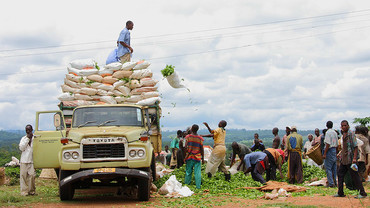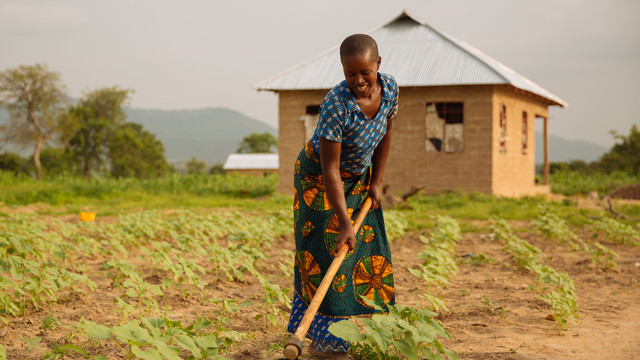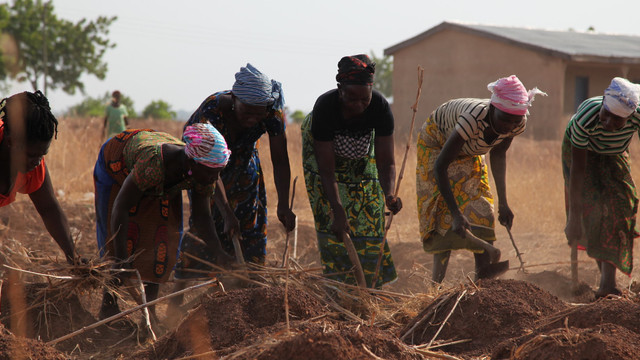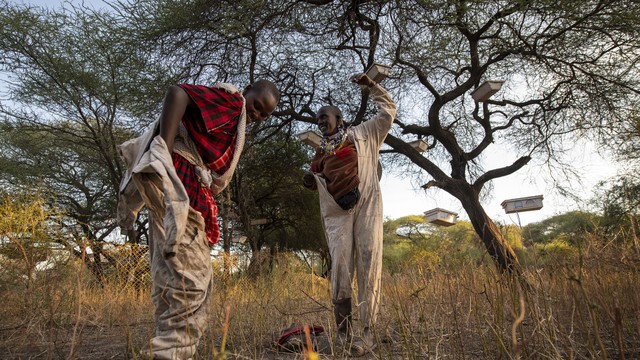Legal empowerment with a gender lens: how women tea farmers in Malawi are claiming their rights
Guest blogger Kumvana Mtukule describes how the work of a women’s rights organisation in Malawi supported smallholder tea farmers to claim their rights and assert agency.


Farmers harvesting tea in Mulanje, Malawi (Photo: Skip Russell, via Flickr, CC BY-NC-ND 2.0)
Tea is a major cash crop in Malawi and the industry is one of the country’s biggest employers. For small-scale farmers, it is an important source of cash income. But deep gender inequalities prevail at smallholder level, and women tea farmers are being left behind.
As part of the Empowering Rural Producers in Commercial Agriculture project, women’s rights organisation Women's Legal Resources Centre (WOLREC) explored legal empowerment – the process through which people assess and secure their rights – focusing particularly on women smallholder tea farmers and how it could support their agency in their commercial relations.
Knowledge, skills − and contribution to society
In Malawian society, men and women are perceived as having different sets of knowledge and skills, and each gender tends to conform to socially ascribed roles.
As such, gender stereotyping around knowledge and skills plays out strongly in the smallholder tea farming sector: male tea farmers are considered to have knowledge of how to make their tea businesses profitable, to know which inputs will optimise production, and to know how to negotiate what will work for their tea business.
Women meanwhile assume subordinate roles; their knowledge is often perceived to be limited to how to work the land. Because of this, they are rarely skilled in negotiating – for example, if they were to be involved in agreeing prices for the sale of their tea, they are likely to agree to any offer made without attempting to negotiate for a better price.
Working with the Nsuwadzi Tea Association, a smallholder out-growers association, WOLREC explored legal empowerment as a tool for strengthening the agency of Nsuwadzi smallholder tea farmers, exploring how to realise their rights to choose, act and affect change in line with their priorities and needs. WOLREC approached legal empowerment with a deliberate focus on gender equity.
Gender audit: unpacking perceptions
WOLREC carried out a gender audit to assess the understanding of gender equity among men and women members of the tea association.
Questions were wide ranging – from examining gender roles in society more broadly, to household dynamics and commercial relationships: who do you see as your community’s leaders? As a woman, how do you view your role in the community? How do you view the role of men? How do you view your contribution to society? Who handles household finances? Do you view yourself as home carer, or a business farmer? Would you be able to lead the association if put in a leadership position?
Questions were also put to men. The gender audit covered around 196 farmers in total, 98 of whom were women.
The findings showed that although women and men understood the concept and importance of gender equity, they did not practice it.
Women clearly saw the value of leadership, of building knowledge and skills, of contributing to and developing their communities but did not associate themselves with leadership.
The gender audit also showed that although women see the value of their participation in leadership and development, they are held back by cultural stereotypes around gender: men are natural leaders; men have the right and priority to develop and acquire new knowledge; women belong in the home; resource invested in women’s development is wasted resource; leadership roles are too demanding for women; women are not able speak out in public meetings.
In short, society does not expect women to lead or to develop and contribute to their communities.
Such deeply ingrained assumptions heavily undermine the agency of women – within their households, their communities, their associations and in their commercial relations.
Tackling these assumptions as part of a legal empowerment processes equips both women and men with knowledge of their equal claim to rights and raises awareness of their equal duties to develop and contribute to society − in turn creating a sense of individual responsibility to learn.
Growing agency among women tea growers
Responding to the gender audit, WOLREC supported the creation of women-only forums where women would gather and were equipped with skills to challenge cultural stereotypes, to not shy away from taking on leadership positions, and to actively contribute to the development of their communities.
Women built skills in public speaking, leadership – nurturing women leaders and instilling the importance of gender-balanced leadership and negotiation − and advocacy. The association as a whole was also supported with gender mainstreaming mentorship sessions where members were supported to develop gender action plans as a tool of assessing how gender could be integrated in their work.
Legal empowerment with a gender lens – a win-win for women and men
Legal empowerment, with a deliberate focus on gender, can not only improve women’s legal literacy by building their understanding of their rights, but can also empower them to challenge gender stereotypes and to fully exercise their rights.
WOLREC’s work showed that gender-related cultural and societal barriers must be acknowledged, confronted and broken down in order for women farmers to begin to truly claim their rights and agency, and assume an equal role in their farming communities.
WOLREC’s work also showed how intentionally applying a gender lens in legal empowerment processes can build men’s understanding that gender equity is a legal requirement. By bringing this legal perspective, men recognise and appreciate the value of gender equity in decision-making.
With proper understanding of women’s right to claim an equal role in the community, men promote the full participation of women in the farming community and in society more broadly.
Applying a gender lens to legal empowerment means both genders have the necessary knowledge and understanding of rights and are fully able to exercise those rights. A win-win for women and men creates lasting benefits for everyone.




